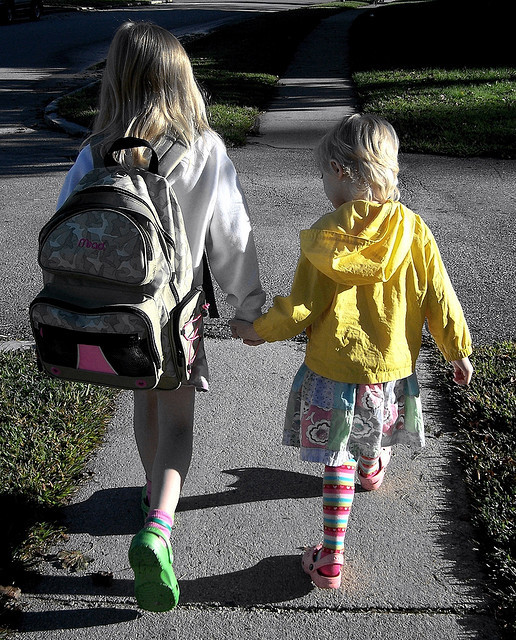THE delay in new adoption legislation means that thousands of children living in “kinship care” continue to be denied vital support and financial help.
A recently published UK-wide study based on the 2001 Census figures found that 5,200 children in Northern Ireland were being raised by family members who were not their parents. It is thought that the number would now be significantly higher 10 years on.
The highest rates in 2001 were in Belfast with around two in every 100 children living with relatives in west Belfast. Almost half of the children were living with siblings.
Kinship Care often involves informal arrangements with many families struggling because they receive no financial support from social services.
If these informal arrangements collapsed and all of the young people moved into care, the number of children being looked after in residential care in Northern Ireland would treble.
The new Adoption and Children Bill considered during the last sitting of the Assembly proposed new ‘special guardianship orders’ to provide greater permanence for young people for whom adoption is not appropriate.
However, these new orders which would benefit kinship carers remain in limbo after former Health Minister Michael McGimpsey removed the bill from the Assembly’s legislative programme last year.
There is likely to be no move on the new adoption laws until the conclusion of a judicial review taken by the Northern Ireland Human Rights Commission.
Kinship Care Northern Ireland is a charitable organisation committed to helping and supporting grandparents, kinship and sibling carers who are looking after and caring for children of their extended families.
Jacqueline Williamson is the charity’s founder and chairperson. She grew up in the care system in Northern Ireland and is kinship foster carer of her niece.
She said: “Many kinship carers do not want to ask for help because they are scared people will think they are not coping and that this could result in the children being put into care.
“Many are proud and private people and there can also be an element of embarrassment that a family member has got to the point where they cannot look after their children. For many people in this situation it is very easy for them to become overwhelmed."
Ms Williamson said that kinship carers are very often looking after small children and multiple numbers of children.
“If they were in the care system, siblings can be split up,” she continued. "I do think it is important to try and keep children within their own families and to link in support to them.
“Many children are in kinship care for exactly the same reasons as children who end up in residential care or stranger foster care but most do not receive the financial support that non-relative stranger foster carers receive.
“It costs £2,000 a week to put a child into care. If family members did not take on the care of thousands of children I think the care system would crumble.
“The special guardianship orders proposed in the new legislation are a good concept and I would welcome anything which would give more support to kinship care arrangements.”
The major study of kinship care by Buttle UK and the University of Bristol was published earlier this month and is based on 2001 Census information.
It reported that around 173,200 children across the UK were being raised by family members in 2001 because their parents were unable to care for them. This equates to one in every 77 children.
Northern Ireland had the lowest rates of kinship care in the UK (one in every 91 children) in 2001 but the highest prevalence (1.8%) among older teenagers living with relatives.
The researchers estimated that 90% of children living in kinship care arrangements in Northern Ireland in 2001 were doing so informally. This means that they and their carers would not have been entitled to, and would be unlikely to have received, the same level of financial or other support provided to children living in formal placements.
One of the most striking findings was that nearly half (49%) of all the kinship care children here were being cared for by a sibling – this is higher than the other parts of the UK where the majority were living with grandparents.
In a considerable number of cases children were being raised by older siblings with no additional help or support from other or older household members.
In 41% of cases here, children were being looked after by grandparents.
Gerri McAndrew, chief executive of Buttle UK, said: “Kinship carers are an invisible population who have little contact with social services. This report shines a light, for the first time, on this hidden group who play a critical role in raising a generation of children and young people with little assistance, financial or otherwise.
“Our analysis provides a snapshot of the issue in 2001, but the number of children affected is already significantly higher partly due to changes to the nature of the family, increasing levels of problem drug and alcohol use, and legislation that encourages the placement of children with family.”
Case studies from Kinship Care Northern Ireland (names have been changed):
1. Margaret (62) has been looking after her five grandchildren – aged 13, 10, 7, 6 and 4 – for the last 14 months due to issues of alcohol and drug misuse within the parental home. Margaret, who underwent surgery for breast cancer two years ago, lies in bed at night fretting she will die before the children reach the age of 18 and that the children will end up in care.
2. Laura (23) has been caring for her four-year-old nephew Jason for the last 10 months due parental neglect and emotional abuse. Laura is a 2nd year university student. She works part-time but finds it hard taking care of Jason because of her course commitments and a lack of childcare facilities that she can afford. Laura has become stressed and anxious about her ability to parent Jason as he is sometimes aggressive towards her. Laura is now contemplating giving up her education as she cannot afford to look after Jason and continue with her studies.
3. Heather (55) has been looking after her two grandsons Andrew (9) and Paul (6) for the last three months. They have five siblings living in foster care who they see for two hours each week. Andrew in particular feels very alone and wants his brothers and sisters to come live with him and his grandmother. Heather feels she would be unable to look after all seven grandchildren and is trying her best to keep Andrew and Paul within the family so they don’t end up in care.
4. Claire (52) agreed to look after her two grandchildren – then aged two and four – when her daughter arrived to her home in the early hours of the morning stressed and unable to cope. Claire accepted responsibility for the children as a temporary measure. Nine and a half years later and Claire is still looking after her grandchildren full-time. Claire has not heard from her daughter in four years.
- Read Jacqueline Williamson’s blog at http://jacquelinewilliamson.wordpress.com/

